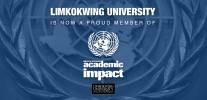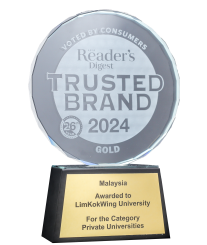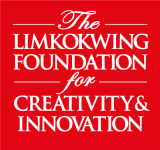Doctor of Philosophy (PhD) Information Systems
LIMKOKWING GRADUATE SCHOOL (R2/480/8/0025)(02/28)(A10543)
The PhD Information Systems provides Doctoral candidates with theoretical knowledge and methodological skills to enable them to become productive researchers. Through a combination of coursework, research seminars, and mentored research, Candidates enrolled in PhD Information Systems study problems that practicing IS professionals and manager’s face; as they design, use, and apply information systems and technologies to solve business problems.
Candidates also acquire breadth of knowledge in the range of issues that define the field of IS, as well as in-depth expertise in an area of their choice.
Objectives
The objectives of the course are:
- To provide students with fundamental knowledge about the various facets of information systems and operations among others
- To produce high quality doctorate candidates with advanced skills in teaching, research, managerial, entrepreneurial, strategic knowledge and skills necessary for leading and managing all facets of contemporary organizations
- To provide each candidate the expertise and skills necessary to be an effective educator or practitioner in Information Systems
- To produce researchers who can advance Information Systems theory and practice and enhance the contributions that business can make to the larger community
- To produce graduates with advanced capabilities in leadership and managing change. Graduates will be able to examine any formal organization and discern its strengths, weaknesses, opportunities and threats. In turn, they will be able to make assessments and prescriptions accordingly
- To advance the long term viability of candidates employer organizations through the candidates high level intellectual contributions and innovative problem solving abilities
- To provide for considerable personal development such that the PhD graduates achieves a greater level of effectiveness as a professional practitioner, educator or manager. Upon graduation , participants will have developed a portfolio of personal , transferable competencies appropriate for their planned and projected career objectives as a senior manager, educator and entrepreneur
- To engender an enjoyable educational experience responsive to the rapid rate of technological , organizational and global changes shaping modern day organizations
- To accomplish the country’s objectives of developing professionals and managers with PhD doctoral qualifications
- To facilitate in depth studies of particular aspects of information systems research
- To improve professional practice through the application of research and case methodologies to information systems problems and issues
Learning Outcomes
At the end of this programme, students will be able to:
- Explain and apply a range of quantitative and qualitative research methods frequently used in research to solve current information systems problems
- Construct research questions that can be examined empirically following the methods of social sciences
- Demonstrate an understanding of the state-of-the-art knowledge in the field of students research
- Demonstrate independent and critical thinking ability and appreciate the ethical issues and concerns relevant to the discipline
- Generate new and readily applicable knowledge in a chosen area of information systems typically relevant to their host organizations and their own career objectives, leading to an improved understanding of how to lead and manage an organization effectively in a global and rapidly changing environment
- Appraise and select innovative and creative solutions to management problems and opportunities
- Apply relevant theoretical knowledge to contemporary information system problems
- Critique contemporary organizational practice in light of relevant theory
- Assess information systems research studies in order to rate their quality and applicability in improving the effective handling of organizational problems
- Manage behavioral , policy and strategic issues to improve the effectiveness of their own organizations
- Identify, analyze and evaluate internal and external environmental influences on organizations in order to develop strategic plans via use of Information Systems for the management of change and the development of their organizations
- Compose superior written reports and skills relevant to business organizations
Target Audience
- Academicians, Researchers in IS industry, Entrepreneurs in IS Industry, IS Managers, IS Development Professionals, IS Consultants
| 1st Level |
|---|
| Advanced Research Methodologies |
| Advanced Quantitative Methods |
| 2nd Level |
|---|
| Thesis |
Alumni Profile

Mogakolodi Mogotsi Koketso
Mogape Solutions, Owner
All successful people have is persistence. He has taken this philosophy to heart, emerging as one of LEAP’s many success stories in the process.
Career Opportunities
- CEOs/MD of companies
- Consultants and Trainers in Information Systems
- Successful practitioners, Academicians and researchers in the field of Information Systems
About the Industry

Computing is usually defined as the activity of using and improving computer hardware and software. It is the computer-specific part of information technology. Computer science (or computing science) is the study and the science of the theoretical foundations of information and computation and their implementation and application in computer systems.
Industry Partner

Hewlett-Packard
While Hewlett-Packard may be known for product innovation, the company's corporate development is…
Entry Requirements
- A Master’s degree in a business or related field as accepted by the HEP Senate
- Note: For Doctoral degree by Research as stated in the Standards: Master’s and Doctoral Degree: i. There shall be no direct entry from Bachelor’s degree level to Doctoral degree level. ii. Candidates with Bachelor’s degree who are registered for Master’s degree by Research programmes may apply to convert their candidacy to the Doctoral degree programmes within ONE (1) year after Master’s degree registration, subjected to: a. having shown competency and capability in conducting research at Doctoral degree level; b. rigorous internal evaluation by the HEP; and c. approval by the HEP Senate OR
- Other qualifications equivalent to a Master’s degree as accepted by the HEP Senate AND
- English Proficiency Requirement for International Students
IELTS 6.0 OR TOEFL iBT 68-93 OR TOEFL PBT 551-589 OR CAE 169 - 194(Cambridge Advance English) OR CPE 169 - 194(Cambridge Proficiency English) OR CFE 169 - 194(Cambridge First English) OR PTE 51-64(Pearson Test of English Academic) OR MUET Band 4
- A Master’s degree in a business or related field as accepted by the HEP Senate
- Note: For Doctoral degree by Research as stated in the Standards: Master’s and Doctoral Degree: i. There shall be no direct entry from Bachelor’s degree level to Doctoral degree level. ii. Candidates with Bachelor’s degree who are registered for Master’s degree by Research programmes may apply to convert their candidacy to the Doctoral degree programmes within ONE (1) year after Master’s degree registration, subjected to: a. having shown competency and capability in conducting research at Doctoral degree level; b. rigorous internal evaluation by the HEP; and c. approval by the HEP Senate OR
- Other qualifications equivalent to a Master’s degree as accepted by the HEP Senate AND
- English Proficiency Requirement for International Students
IELTS 6.0 OR TOEFL iBT 68-93 OR TOEFL PBT 551-589 OR CAE 169 - 194(Cambridge Advance English) OR CPE 169 - 194(Cambridge Proficiency English) OR CFE 169 - 194(Cambridge First English) OR PTE 51-64(Pearson Test of English Academic) OR MUET Band 4
International Students
For non-Malaysian citizens, please refer to the Malaysian Qualification Agency’s (MQA) List of Overseas Qualifications & its equivalency with Malaysian Education System (PDF) to see if you meet the minimum entry requirements to obtain a student visa into Malaysia to undertake this course.

















